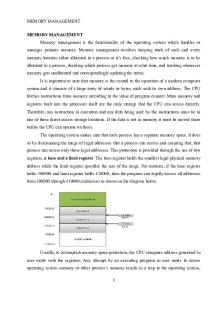Memory lecture notes PDF

| Title | Memory lecture notes |
|---|---|
| Course | Intro to Psychology |
| Institution | University of Michigan |
| Pages | 2 |
| File Size | 69.3 KB |
| File Type | |
| Total Downloads | 112 |
| Total Views | 151 |
Summary
lecture notes...
Description
3/2/09
“Memory”
Psych 111
1. The importance of memory 2. Three kinds of memory stores A. Sensory memory i. Short duration: less than a second (1/3) ii. Large capacity iii. Memory-specific stores a. Acoustic memory b. Eidetic memory (things we have seen) B. Working memory i. Short duration: a few seconds (15-30) ii. 7 +/- 2 items iii. Techniques to extend working memory a. Rehearsal b. Chunking iv. The serial-position effect a. Ability to remember the first and last things on a list but not the things in the middle b. primacy effect – ability to remember the first things in the list more than other things – longer exposure c. Combined with recency effect - first things in short term memory are replaced by new things – ability to remember the last things on the list because they’re not kicked out yet C. Long-term memory i. Virtually unlimited capacity & duration ii. A bunch of repositories overlapping iii. Sensory -> short term -> long term iv. ATTENTION is stuff that’s likely important and then it goes to working memory/short term memory v. Consolidation of some memories can take months or be instant etc. within long term memory vi. Types of LTM: a. Implicit – things you know how to do (skills, actions) that you can’t quite describe to others – like learning to ride a bike (you pretty much remember it always) b. Explicit – things you can recall and articulate (1) Semantic – encyclopedic memory – word meanings, FACTS, locations, history, stories, etc. (2) Episodic – memories for your biography – EXPERIENCES and life history i. Flashbulb memories – memories that are exceptionally vivid like a snapshot – not as accurate but more realistic – impossible to doubt that they happened?
1
ii. Moments that were frozen like a photograph such as where you were when you heard about 9/11 3. Coding A. Depth of processing (Myers’ handout 24-2) i. People remember information better when they process it in a
meaningful rather than superficial way? B. Breadth of processing i. the distance between informational units that are related
during processing? 4. Remembering A. The act of remembering B. False memories C. Memories change over time because you reconstruct them differently over time 5. Forgetting (Myers’ handout 23-1) A. Decay i. If they’re not accessed they will eventually go away B. Interference i. Retroactive interference a. learning new information interferes with the recall of older
information ii.
Proactive interference a. older information learned previously interferes with the
recall of information learned more recently C. Amnesia i. ii.
iii.
Retrograde a. loss of memory for events before a trauma Anterograde a. The inability to remember new information from the period
after the trauma Childhood
a. Can’t remember things for the first 3 years of your life b. When you’re 5 you can remember stuff when your 2 but when you’re 10 you can’t c. The new style of the brain cannot recognize the encoding of those memories so cannot read them D. Repression i. he psychological act of excluding desires and impulses
(wishes, fantasies or feelings) from one's consciousness and holding or subduing them in the unconscious. 6. Improving memory A. Organization of information
2...
Similar Free PDFs

Memory lecture notes
- 2 Pages

Memory File - Lecture notes 6
- 5 Pages

Computer Memory - Lecture notes 3
- 13 Pages

Lecture 7 Human Memory
- 12 Pages

Chap 7- Memory - notes
- 4 Pages

Memory Revision Notes
- 9 Pages

Notes - Memory and Cognition
- 146 Pages

Memory - Summary Notes
- 18 Pages

Memory Notes PDF
- 53 Pages

Chapter 7 Notes - Memory
- 5 Pages

Chapter 8: Memory Notes
- 5 Pages

Chapter-6-Memory - notes
- 9 Pages
Popular Institutions
- Tinajero National High School - Annex
- Politeknik Caltex Riau
- Yokohama City University
- SGT University
- University of Al-Qadisiyah
- Divine Word College of Vigan
- Techniek College Rotterdam
- Universidade de Santiago
- Universiti Teknologi MARA Cawangan Johor Kampus Pasir Gudang
- Poltekkes Kemenkes Yogyakarta
- Baguio City National High School
- Colegio san marcos
- preparatoria uno
- Centro de Bachillerato Tecnológico Industrial y de Servicios No. 107
- Dalian Maritime University
- Quang Trung Secondary School
- Colegio Tecnológico en Informática
- Corporación Regional de Educación Superior
- Grupo CEDVA
- Dar Al Uloom University
- Centro de Estudios Preuniversitarios de la Universidad Nacional de Ingeniería
- 上智大学
- Aakash International School, Nuna Majara
- San Felipe Neri Catholic School
- Kang Chiao International School - New Taipei City
- Misamis Occidental National High School
- Institución Educativa Escuela Normal Juan Ladrilleros
- Kolehiyo ng Pantukan
- Batanes State College
- Instituto Continental
- Sekolah Menengah Kejuruan Kesehatan Kaltara (Tarakan)
- Colegio de La Inmaculada Concepcion - Cebu



